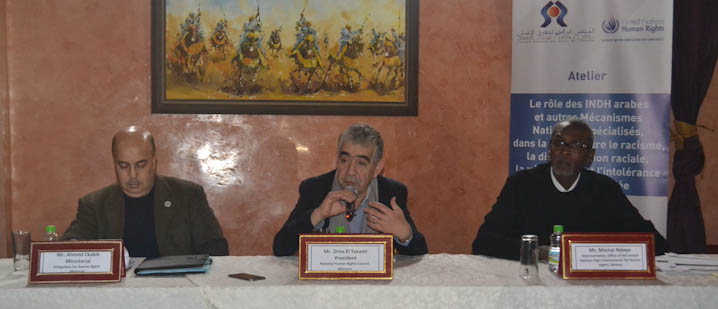Dozens of human rights experts gather Wednesday in Rabat to probe Arab NHRIs’ role in fighting racism and related intolerance

More than 30 national and international experts started Wednesday 21 December 2016 a two-day regional discussion on the role of Arab National Human Rights Institutions (NHRIs) and other national mechanisms in charge of fighting racism, racial discrimination, xenophobia and related intolerance.
The representatives of NHRIs and NGOs from Morocco, Tunisia, Egypt, Mauritania, Oman, and Qatar shared their insights and practices with the United Nations High Commissioner for Human Rights and other United Nations human rights mechanisms.
Racism, racial discrimination, xenophobia and related intolerance are, according to the Durban Declaration and Program of Action, “serious violations of and obstacles to the full enjoyment of all human rights and deny the self-evident truth that all human beings are born free and equal in dignity and rights, are an obstacle to friendly and peaceful relations among peoples and nations.”
The regional workshop was an opportunity to tackle racism, racial discrimination, xenophobia, and intolerance in the Arab world. It was also an opportunity to engage on the matter with the UN Committee on Migrant Workers, the UN Committee on the Elimination of Racial Discrimination, and several non-Arab international experts.
The participants highlighted that “our efforts should focus more on human rights education to change attitudes and help eliminate racial discrimination in the region”. Human rights principles and concepts should be integral parts of school curricula to fight against all forms of racial discrimination, they recommended. Mainstreaming the fight against discrimination into public policies is another effective mechanism to fight this scourge.
Many other proposals and recommendations emerged from the discussions on the roles of NHRIs and NGOs in the Arab region. These include handling discrimination-related complaints and helping victims access to judicial remedies. These also include monitoring discrimination and other related issues and reporting them to the different stakeholders, including Parliament, competent government departments, and international and regional human rights mechanisms, with rich data, figures and statistics about racial discrimination and related issues.
NHRIs and NGOs in the region, should also review the national legislative and institutional frameworks, find gaps, and suggest concrete recommendations to their national governments and competent stakeholders, in light with the international and regional human rights instruments, particularly the Convention on the Elimination of All Forms of Racial Discrimination and the Convention on the Elimination of All Forms of Discrimination against Women.
Discrimination in the Arab region, as the participants noted, is practiced both secretly and visibly, against many groups based on gender, race, social status, religion, etc. Migration issues further exacerbate the different forms of discrimination. In this regard, the workshop recommended conducting a study on the situation of migrants in the region, focusing particularly on discrimination and related issues.
The participants called for the establishment of independent mechanisms or mechanisms integrated into national bodies to prevent discrimination and related issues at the national level, not to mention capacity building for the different actors, particularly law enforcement officers, private sector, media, and government bodies working in health and education.
The regional workshop was held by the National Human rights Council (CNDH), in partnership with the Office of the United Nations High Commissioner for Human Rights. The organization of a follow workshop is being considered by the partners for 2018.






















